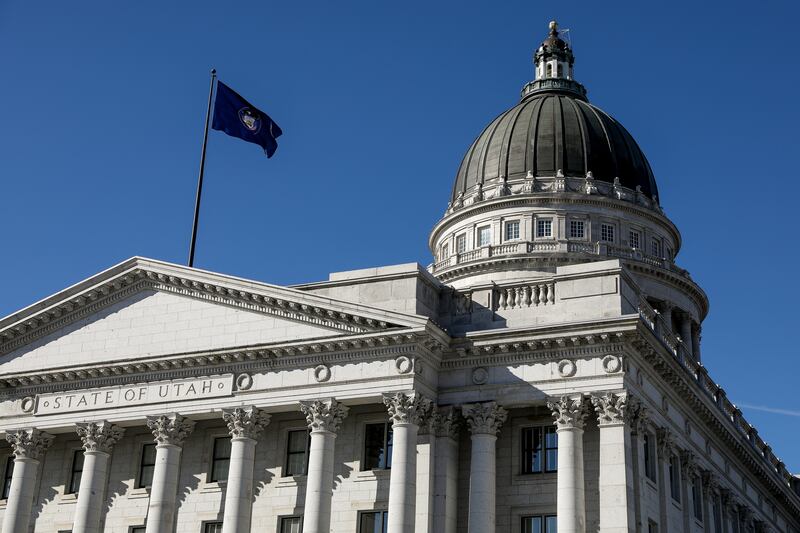SALT LAKE CITY — A bill vetoed by Gov. Gary Herbert that would have created a new scholarship program for families with children with special needs to seek services at private schools has been added to the agenda for next week’s special session.
Senate President Stuart Adams, R-Layton, said the legislation is one of two bills vetoed by the governor that will be added to the agenda for next week’s special legislative session, the first called by lawmakers.
The Utah State School Board, the Utah Education Association, the Utah School Boards Association and Utah School Superintendents Association and Utah PTA each requested that Herbert veto HB332 over concerns that the Special Needs Opportunity Scholarship program would place significant oversight burdens on the state school board.
Adams said he understands why there are some concerns with the bill about oversight. He said adding the bill to the special session, which will be conducted virtually, allows the opportunity to reach an agreement with the governor on changes to the bill so an override wouldn’t be needed.
“If we reach consensus, great,” the Senate president said. “If we don’t, we always have that option.”
House Majority Whip Mike Schultz, R-Hooper, the bill’s sponsor, said making changes or overriding the governor’s veto are both options at this point.
“I would be good with either a special session or a veto override on mine. I believe we could get enough support for either,” Schultz said. So far, he said, there’s no agreement on any changes to his bill or the other vetoed by the governor, HB356, which repeals a tax exemption for railroad fuel.
“It’s doubtful either one would have very big changes,” Schultz said, adding that if changes can’t be agreed upon, “we will likely just do a veto override. That’s why it’s all up in the air right now.”
Some critics described the bill sponsored by Schultz, HB332 as “voucher-like.” In the past, education stakeholders have vigorously opposed any form of education voucher. In 2007, Utahns voted 62% to 38% to reject a school voucher referendum. The referendum was defeated in every county.
Critics also said there was no need for another scholarship program in addition to the Carson Smith Special Needs Scholarship established 15 years ago.
The Carson Smith Special Needs Scholarship Program provides tuition assistance for eligible special needs students enrolled in eligible private schools. The scholarships are funded through the state’s General Fund, which is funded by state sales tax revenues.
HB332 created a refundable tax credit for individuals and corporations to fund the Special Needs Opportunity Scholarship program.
Supporters of HB332 said the Carson Smith scholarships program has been highly successful, but it relies on state sales tax revenues. Lagging sales tax revenues are contributing to a structural imbalance between the education and general funds, legislative leaders say.
Asked to comment on legislative leaders’ decision to add the bill to the special session agenda, State School Board spokesman Mark Peterson said Tuesday, “The Utah State Board of Education voted to ask for a veto of the bill. That position hasn’t changed.”
Utah PTA called on its members, should lawmakers call a veto override session, to contact their legislators and ask them to oppose HB332.
“This bill sends PUBLIC SCHOOL MONEY TO PRIVATE SCHOOLS! This bill provides scholarships to students within certain special education categories to attend private schools. It is funded through a nonrefundable corporate or individual tax credit for program donations made to a Scholarship Granting Organization,” Utah PTA’s website states.
“Utah PTA supports public money funding public schools, and opposes vouchers, tax credits and deductions and other similar funding sources for public and private preschool, elementary and secondary school tuition and other education-related expenses for students.”
Heidi Matthews, president of the Utah Education Association, said the association’s focus is “looking to the future and the needs of all public school students and keeping the resources in our public schools.”
If lawmakers address HB332 in a veto override session, it would take a two-thirds vote to override the governor’s veto and the bill cannot be amended.
The bill passed by five votes in the Utah Senate and by a vote of 46-24 in the Utah House of Representatives.
Matthews said UEA is concerned about how the state can support student learning moving into the fall. The pandemic has “laid bare” inequities in student learning and supports, she said.
“We’re going to have some significant challenges come fall,” Matthews said. “Our Legislature has been wise in planning for this inevitability (economic downturn) although I don’t think we thought it would happen this soon.”
Adams said the other vetoed bill that will go on the special session agenda, sponsored by Rep. Joel Ferry, R-Brigham City, deals with lifting a tax exemption on railroad fuel so the revenue can be used to improve railroad crossing safety.
”I think there’s a real need for railroad crossings,” Adams said. “Safety is a big deal and these crossings, they’re expensive to build and they’re dangerous at times so I think there’s a real motivation for us to try to find a way to solve some of the safety issues that exist at the crossings.”
Another issue that could be addressed by lawmakers during the special session is providing guidance on the remittance of state sales tax by merchants, which has been complicated by the COVID-19 pandemic.
“The Utah State Tax Commission has been approached by a number of merchants who collect sales tax, with concerns about the ability to file returns and remit the sales tax on time at the end of this month due to the impacts of COVID-19.
“In this regard, we have been asked by legislative leadership, with concurrence of the governor’s office, to defer any action on addressing COVID-19 impacts on sales tax until after the legislature can meet in special session later this month,” according to a statement from the Utah State Tax Commission.
Contributing: Lisa Riley Roche


